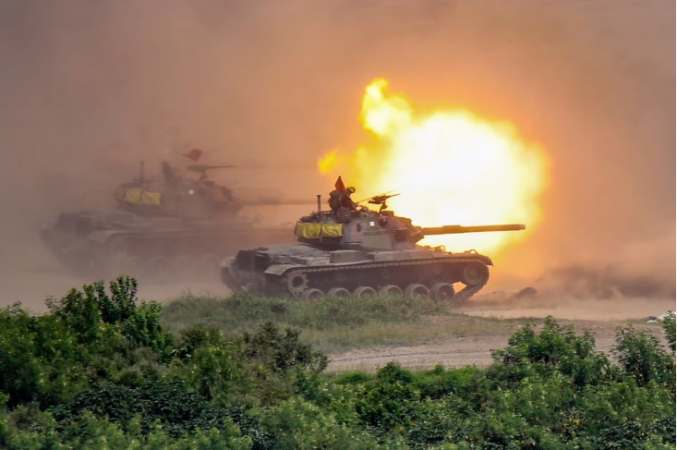
MOSCOW: The United States is considering options for a sanctions package against mainland China to prevent it from invading Taiwan, and Taipei is putting diplomatic pressure on the European Union to follow suit, according to informed sources.
According to sources, discussions in separate lobbying by EU envoys from Washington and Taipei are both in early stages and in response to growing concerns about mainland Chinese aggression due to escalating military tensions in the Taiwan Strait.
In both cases, the goal is to move beyond the already existing restrictions in the West and impose additional restrictions on trade and investment with China in politically sensitive areas such as telecommunications and computer chip manufacturing.
Sources did not elaborate on what is being considered, but the idea of imposing sanctions on the world's second-largest economy and one of the most important links in the global supply chain raises doubts about its viability.
The imposition of sanctions against it is likely a far more complex exercise than sanctions against Russia, according to Nazak Nikkhtar, a former senior US Commerce Department official, given the broader economic entanglements of the US and its allies with China.
US House of Representatives Speaker Nancy Pelosi visited Taipei last month in what Beijing regarded as a provocation, after China launched missiles on the island and sent warships across its unofficial maritime border. Beijing also declared Taiwan its territory.
Chinese President Xi Jinping has vowed to use force if necessary to bring Taiwan's democratically-run government back to the mainland. At the Communist Party Congress next month, he is expected to win a third, five-year leadership term.
Officials in Washington are considering options for a possible package of sanctions to prevent Xi from trying to invade Taiwan, according to a US official and a nation official working closely with Washington.
US sanctions talks were underway in February after Russia invaded Ukraine, according to two sources, but gained new momentum following China's response to Pelosi's visit.
In January, the United States and its NATO allies threatened Russia with undisclosed sanctions, but this failed to deter Russian President Vladimir Putin from launching an invasion of Ukraine.
According to the non-US official, the White House is focused on bringing countries closer together, including coordination between Europe and Asia and avoiding upsetting Beijing.
The White House decided not to respond.
The recent war games in China and the "Great Challenges" by China discussed Taiwan and the region, with Taiwan's foreign ministry discussing it with the United States, Europe and other like-minded partners, although unable to provide details. was.
Requests for comment from the Chinese Foreign Ministry remained unanswered.
Following Russia's invasion of Ukraine, Taiwan had already discussed sanctions with European officials, but China's most recent military exercises have made Taiwan's position more stringent, according to six sources in Taiwan-Europe discussions. who spoke with Reuters.
Leading Taiwanese officials have become more vocal in recent weeks about the need to plan for sanctions. He has recently stepped up his efforts with Europe in response to a Chinese white paper that has withdrawn a pledge not to send troops or administrators to Taiwan if Beijing takes control of the island.
According to a source familiar with the discussions, Taiwan has not requested anything in particular, only that Europe prepare its own response if China strikes and has warned China privately that it should face the consequences. Will be
According to a second person familiar with the situation, EU officials have so far refrained from imposing severe sanctions against China over human rights violations because the country is far more important to the bloc's economy than Russia.
European sanctions would require the consent of all 27 member states, which is often elusive; Even after Russia was isolated after the invasion of Ukraine, it was difficult to reach a compromise, as its gas was vital to Germany.
Although Taiwan and European officials have had extensive, personal contacts since China's military exercises began, sources say the whole of Europe, except the Vatican, does not have formal diplomatic relations with Taipei, but with Beijing.
Germany, the bloc's economic engine, is "careful" according to a different official with knowledge of the negotiations. "I don't think the attitudes of Russia and Ukraine on their relations with China have changed fundamentally."
However, the German government is becoming increasingly concerned about its dependence on China for economic development; On Tuesday, the economy minister promised a new business strategy and "no more gullibility".
Olaf Scholz's spokeswoman declined to respond to a question.
US Department of Justice There are no objections to Trump's nominee for Special Master
Western Sanctions Are Creating a New more Eastward Russia
Imran Khan says he wants a "good relationship" with the United States, not "slavery."